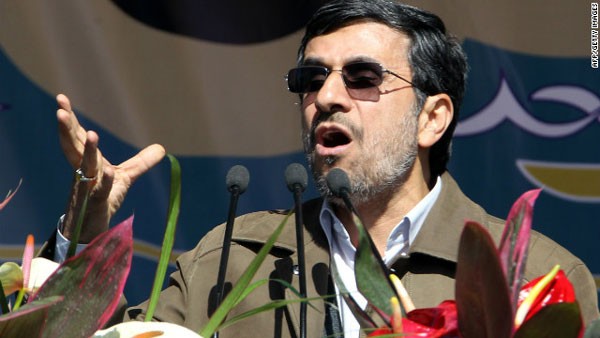(VOVworld) 48 million eligible voters cast ballots on Friday to elect new members to Iran’s parliament. This election will be a contest between President Mahmoud Ahmadinejad’s conservative camp and the Supreme Leader Ayatollah Ali Khameni’s religious faction. Analysts say that whoever wins, Tehran’s hard-line stance on its nuclear program will remain unchanged.
 |
President Ahmadinejad reiterates Iran's determination for nuclear development
(Photo: CNN) |
This election is the first public vote since the controversial 2009 presidential election which led to 8 months of pro-reform street demonstrations. Some 48 million voters will elect deputies to Iran’s 290-seat assembly of the 3,400 eligible candidates, setting the stage for next year’s presidential election.
The parliamentary election pits supporters of President Mahmoud Ahmadinejad against loyalists to Supreme Leader Ayatollah Ali Khamenei. Both men support Iran’s hard-line policy on nuclear issues. President Ahmadinejad is seeking to replace Khamenei, who holds the most powerful position in Iran’s complex political apparatus. According to Iranian law, the supreme leader has the power to appoint or dismiss the ministers of intelligence, defence and foreign affairs. Whatever the election result is, real power is in the hands of the supreme leader, who will decide key national issues such as Iran’s nuclear policy or relations with the US. Although Khamenei stands on the side of the President, the supreme leader never permits Ahmadinejad’s conservative allies to challenge his role. But public opinions places more responsibility on President Ahmadinejad. Iran is under mounting international pressure and threats of military attacks by the US and Israel, targeting Tehran’s nuclear installations. Analysts say Iranian voters do not want to see Iran pursue its nuclear ambitions without the hand of the incumbent President on the helm because it will provoke opposition protests and make the situation worse.
Meanwhile, the West’s sanctions have taken a toll on imported energy and food. White House Press Secretary Jay Carney on Wednesday said the US will continue its double policy of diplomacy and sanctions to prevent Iran from pursuing its nuclear programs. He stressed that in Washington’s perception, Tehran hasn’t yet acquired atomic bombs. Carney’s statement shows that President Barack Obama is trying to send a clear message ahead of the US-Israel summit scheduled for next month in the White House. The US and its allies fear of tragic consequences if Israel decides to attack Iran’s nuclear facilities. In the meantime, Washington is conducting a diplomatic offensive to persuade the international community to pressure Iran through coercive measures. General Norton Schwartz, Chief of Staff of the US Air Force, has threatened to attack Iran if diplomatic means fail.
Analysts predict Friday’s parliamentary elections will not change the Islamic Republic’s nuclear ambitions and tension around Iran’s nuclear programs will remain unabated.
Anh Huyen